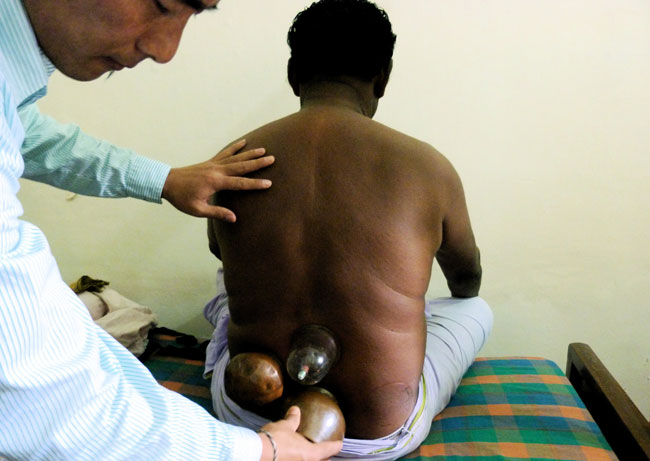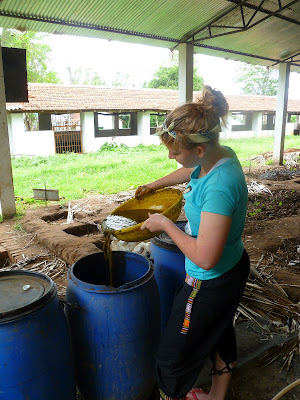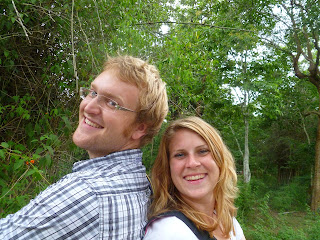It is kind of a bitter, sweet ending (more bitter than sweet). I have come to love this place more than I could have ever expected. When Beau and I first began planning this trip to India I was excited. I never dreamed I would actually get the chance to go to India. Things quickly changed when we moved to Utah and furthered our plans. I began to be scared out of my wits because I had never been away from my family and friends and being even further than I already was made me a little more than nervous. After three months of being here I realize that I had no reason to be afraid. This has been the BEST experience of my life so far and it is even better since I was able share it with my best friend. I owe Beau a huge thank you for dragging me across the world to the most peaceful, friendly place I have ever experienced, "little Tibet," Bylakuppe.
As a closing I would like to share a few of my favorite experiences and realizations as I have been here.
FARM
One of the greatest learning experiences I have ever had has been working on the Organic Research and Training Centre farm. I have not only learned to make liquid manure, natural pesticides, vegetative propagation, pull weeds for hours on end, tie up bitter gourd, harvest basal, prepare Brahmin for sale, care for a nursery, and make compost but I have seen the large spiritual aspect that goes into farming. As I went to the monastery with the farmers I began to see the close connection they have with the soil. As I interviewed farmers on the ORTC farm and other organic farmers they told me of the great personal satisfaction they have when they can farm their own foods. It is particularly important to them to feed their families healthy, nutritional, organic crops so that they can maintain their health and preserve the health of the soil. For most farmers here only a small income is made off their crops. The major point of having a farm is to provide for your own family. Having an organic farm brings purpose to the individuals I interviewed because it allows you to be self-dependent. To the organic farmers it is important to teach their children the same farming techniques so that they can, in the future, have their own farms to feed their family.

MEN-TSEE-KHANG
This was an experience very dear to my heart. It has inspired me to certainly learn more and maybe even return one day to become a Tibetan doctor. Most of my time I spent reading my Tibetan medicine book and asking questions. I observed patients receive their pulse readings, urinalysis, and cupping. I even experienced cupping and pulse reading myself. After a painful back ache from being on the farm and treating it with cupping I can now say that cupping works. After about 24 hours the pain was completely gone. I have also been taking Tibetan medicine to help with my digestion, circulation, and restless legs and I can't help but notice it helping. I have been much more alert during the day and my sleep seems to be better than it has been since I have been here.
Tibetan medicine and Eastern medicine in general uses some of the best logic I have ever seen -- Solve the problem, don't just cover it up. Using plants and herbs in the natural environment makes more sense than using man-made drugs, at least in my mind. Tibetan medicine looks at your physical health, behavior, and diet. It is common for a Tibetan doctor to tell you to stay away from breads, potato, or anything cold. It is important to look all possible imbalances in a person's life even if it means prescribing the patient to relax more often. As I have been in the clinic I have seen the doctor prescribe medication and give diet restrictions to help balance the hot and cold parts within the body. Allopathic doctors very rarely look at a person's diet unless they are obese. I hope that as I work towards becoming a doctor that I will be conscience of my patients' complete needs and look at all aspects of the problem. I also admire Tibetan doctors for the time they are willing to spend with their patients. For the doctors it is important to provide care because of the satisfaction it brings to the patient and the doctor themselves. Unlike most allopathic doctors they are not concerned about the money more than they are the patient.
THE SNAKE
Yesterday, as a going away experience my body decided to get a cold. I had been at the Men-Tsee-Khang most of the day before I decided I had to go home and get some sleep for my body to heal. The moment we reached home I took out my hair-tie, took off my glasses, and lied down. Beau lied down next to me. After only a few minutes Beau says calmly, "Oh, a snake". I immediately fumbled for my glasses while my heart was racing. I looked around unable to spot it when Beau pointed to the sealing. There lay a big, old, fatty snake. We're guessing it was between 6 and 7 feet long. I didn't know how to react. I don't like snakes but it was far enough that I was completely fascinated. As it moved back and forth my insides seemed to turn. We looked at it for a bit before Beau ran to get Namgyal. We spent the next hour or so poking and prying at it to scare it away. We had one person in our room, one outside, and one the main house roof to try to spot its escape. At one point it curled up because it was so angry. It took nearly cutting it in half before the snake finally left. Or at least we think it left.....we never saw it exit.

THE PEOPLE
Tibetans are some of the kindest people I have ever met. When I interviewed individuals I never failed in getting a long enough interview. People love to tell their stories and I absolutely loved hearing them. I was always nervous about finding the right gatekeepers but that seemed to be the easiest part. Damdul was more than happy to have me help on the farm and teach me a few farming techniques and Dr. Pasang was very gracious at having me observe the lady doctor and him. Everyone was so welcoming. They took me under their wings and answered every question I ever asked and more.
Through simply walking down the street and catching rides I was able to meet some of the friendliest people. I have never met so many different people in such a short amount time. The older people are so sweet. They always have a huge smile on their face. I have learned that "Tashi Delek" can go a long ways. My next goal is to learn some more Tibetan before I come back!
As I said before, I have truly loved my time here and I sincerely hope this is a "See you later" rather than a "Goodbye."
Tashi Delek, homies!

















































